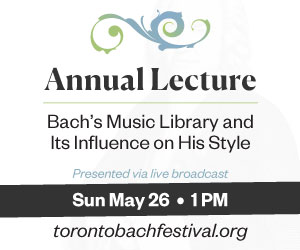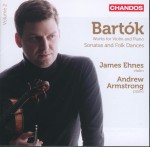 The wonderful James Ehnes is back with more top-notch performances in Bartók: Works for Violin and Piano, Volume 2, with the equally terrific Andrew Armstrong at the piano (CHANDOS CHAN 10752). Volume 1 (CHAN 10705) featured sonatas and rhapsodies; this new CD features sonatas and folk dances.
The wonderful James Ehnes is back with more top-notch performances in Bartók: Works for Violin and Piano, Volume 2, with the equally terrific Andrew Armstrong at the piano (CHANDOS CHAN 10752). Volume 1 (CHAN 10705) featured sonatas and rhapsodies; this new CD features sonatas and folk dances.
Despite the CD’s title, it’s the Solo Sonata from 1944 that opens the recital, and Ehnes gives a commanding performance, perhaps not as edgy as some, but with a great sense of line and energy. The Sonata in E Minor is an early work from 1903 and is perhaps stylistically closer to Brahms than to the composer Bartók was to become. Well worth hearing, it was apparently shelved after its first performance in 1904 and remained both unplayed and unpublished until the 1960s.
Three shorter works complete a generous — almost 80 minutes — CD. The Hungarian Folksongs and Hungarian Folk Tunes were both transcribed from the piano collection For Children, and the more recognizable Romanian Folk Dances are transcriptions of the solo piano pieces of the same name.
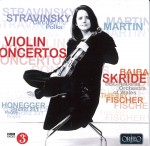 The Latvian violinist Baiba Skride is another player in great form on her latest CD Stravinsky & Martin Violin Concertos, with the BBC National Orchestra of Wales under Thierry Fischer (ORFEO C 849 121 A). There is some beautifully spiky playing in the neo-classical Stravinsky concerto, but the longest work here – and the real gem – is the 1951 concerto by the Swiss composer Frank Martin. It’s a simply lovely work that really should be much better known. The orchestra shines in the Two Symphonic Movements from the mid-1920s by Martin’s fellow countryman Arthur Honegger: the startlingly effective Pacific 231, as good a representation of the physical power of a steam locomotive as you will ever hear and Rugby, which attempts to convey the cut and thrust of the sport. Stravinsky’s short Circus Polka rounds out a highly enjoyable CD.
The Latvian violinist Baiba Skride is another player in great form on her latest CD Stravinsky & Martin Violin Concertos, with the BBC National Orchestra of Wales under Thierry Fischer (ORFEO C 849 121 A). There is some beautifully spiky playing in the neo-classical Stravinsky concerto, but the longest work here – and the real gem – is the 1951 concerto by the Swiss composer Frank Martin. It’s a simply lovely work that really should be much better known. The orchestra shines in the Two Symphonic Movements from the mid-1920s by Martin’s fellow countryman Arthur Honegger: the startlingly effective Pacific 231, as good a representation of the physical power of a steam locomotive as you will ever hear and Rugby, which attempts to convey the cut and thrust of the sport. Stravinsky’s short Circus Polka rounds out a highly enjoyable CD.
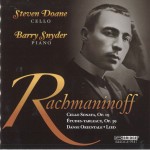 Cellist Steven Doane and pianist Barry Snyder combine for a quite astonishing Rachmaninoff recital on the Bridge label (BRIDGE 9347). It’s astonishing for two reasons: the recordings were made in 1996 and have simply (and inexplicably) sat on the shelf for the past 16 years; and the playing is quite extraordinary. The brief Danse Orientale Op.2, No.2 opens the disc and is followed by an absolutely riveting performance of the Cello Sonata in G Minor. There is a wonderful balance here, with both players producing a full, rich tonal quality.
Cellist Steven Doane and pianist Barry Snyder combine for a quite astonishing Rachmaninoff recital on the Bridge label (BRIDGE 9347). It’s astonishing for two reasons: the recordings were made in 1996 and have simply (and inexplicably) sat on the shelf for the past 16 years; and the playing is quite extraordinary. The brief Danse Orientale Op.2, No.2 opens the disc and is followed by an absolutely riveting performance of the Cello Sonata in G Minor. There is a wonderful balance here, with both players producing a full, rich tonal quality.
What comes next is even better, when Snyder performs the complete Études-Tableaux Op.39 for solo piano; not only is his playing quite stunning, the nine pieces were apparently recorded in a single continuous take, with only a few extraneous sounds over-dubbed after the event. Remarkable.
After back-to-back performances like those, the very brief (2:07) Lied for cello and piano that ends the CD almost seems like an afterthought. The recorded sound throughout is superb.
Sixteen years?? Difficult to explain, but boy, was this ever worth waiting for!
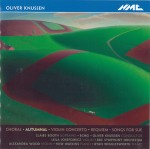 Two imported compilation CDs afford the opportunity to hear three string concertos by contemporary British composers. Oliver Knussen’s 2002 Violin Concerto is included on Autumnal (NMC D178) in a definitive performance by Leila Josefowicz and the BBC Symphony Orchestra, with the composer conducting. The CD also includes Alexandra Wood playing Secret Psalm for solo violin and Wood with Hugh Watkins (piano) performing the CD’s title work. Works for orchestra, solo piano, voice and piano and voice and orchestra complete a fascinating look at this 60-year-old composer’s work over 40 years.
Two imported compilation CDs afford the opportunity to hear three string concertos by contemporary British composers. Oliver Knussen’s 2002 Violin Concerto is included on Autumnal (NMC D178) in a definitive performance by Leila Josefowicz and the BBC Symphony Orchestra, with the composer conducting. The CD also includes Alexandra Wood playing Secret Psalm for solo violin and Wood with Hugh Watkins (piano) performing the CD’s title work. Works for orchestra, solo piano, voice and piano and voice and orchestra complete a fascinating look at this 60-year-old composer’s work over 40 years.
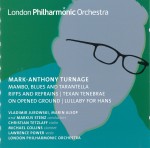 Mark-Anthony Turnage, although only eight years younger, was once a composition student of Knussen’s. The London Philharmonic Orchestra has already issued two CDs dedicated to Turnage on its own label and this third self-titled CD (LPO-0066) features première recordings of five Turnage works. Mambo, Blues and Tarantella: concerto for violin and orchestra is a live recording of the September 2008 world première performance by Christian Tetzlaff, with Vladimir Jurowski conducting. On Opened Ground: concerto for viola and orchestra dates from 2001, and is played here by Lawrence Power, with Markus Stenz conducting. Both works provide ample evidence of Turnage’s blending of jazz and blues influences with classical traditions. Two short orchestral works and the clarinet concerto Riffs and Refrains complete the disc.
Mark-Anthony Turnage, although only eight years younger, was once a composition student of Knussen’s. The London Philharmonic Orchestra has already issued two CDs dedicated to Turnage on its own label and this third self-titled CD (LPO-0066) features première recordings of five Turnage works. Mambo, Blues and Tarantella: concerto for violin and orchestra is a live recording of the September 2008 world première performance by Christian Tetzlaff, with Vladimir Jurowski conducting. On Opened Ground: concerto for viola and orchestra dates from 2001, and is played here by Lawrence Power, with Markus Stenz conducting. Both works provide ample evidence of Turnage’s blending of jazz and blues influences with classical traditions. Two short orchestral works and the clarinet concerto Riffs and Refrains complete the disc.
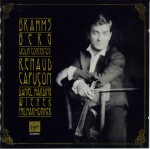 Renaud Capuçon is back with an interesting pairing of two giant concertos from the Austro-German repertoire, the Brahms and the Berg, on his latest Virgin Classics CD (50999 60265326). The disc realizes Capuçon’s long-time wish to record with the Wiener Philharmoniker, conducted here by the excellent Daniel Harding, and it’s one that will certainly please his many admirers.
Renaud Capuçon is back with an interesting pairing of two giant concertos from the Austro-German repertoire, the Brahms and the Berg, on his latest Virgin Classics CD (50999 60265326). The disc realizes Capuçon’s long-time wish to record with the Wiener Philharmoniker, conducted here by the excellent Daniel Harding, and it’s one that will certainly please his many admirers.
Capuçon has been playing these works in public for 15 years, and he is clearly at ease with them. I was particularly interested in his interpretation of the Berg, a particular favourite of mine and a concerto that the soloist considers to be the great violin concerto of the 20th century. It’s hard to disagree. My first reaction was that Capuçon’s smooth, almost genteel approach missed some of the harsh, tragic depth of this very emotional work, but the more I listened the more he convinced me that his approach was the correct one, especially in the Bach chorale in the concerto’s final section.
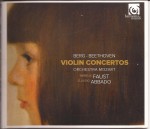 The Capuçon CD gave me the opportunity to compare his performance of the Berg with one on an excellent disc that I meant to review last year, but somehow managed to overlook, that featured Isabelle Faust and the Orchestra Mozart under Claudio Abbado (harmonia mundi HMC 902105). Faust’s approach is much more gritty and acerbic, even in the quiet opening, although the orchestral detail is more clearly defined. The orchestral sound in the Capuçon disc is surprisingly indistinct at times, especially in the middle range and the percussion.
The Capuçon CD gave me the opportunity to compare his performance of the Berg with one on an excellent disc that I meant to review last year, but somehow managed to overlook, that featured Isabelle Faust and the Orchestra Mozart under Claudio Abbado (harmonia mundi HMC 902105). Faust’s approach is much more gritty and acerbic, even in the quiet opening, although the orchestral detail is more clearly defined. The orchestral sound in the Capuçon disc is surprisingly indistinct at times, especially in the middle range and the percussion.
What really makes the Faust CD a great buy is her terrific performance of the Beethoven concerto. Her fairly fast vibrato is more effective here than in the Berg; the outer movements move along at a really bright tempo and the slow movement is beautifully and sensitively drawn out, with lovely dynamics. The lengthy first movement cadenza, complete with timpani accompaniment, is presumably an arrangement of Beethoven’s own cadenza for his piano transcription of the concerto; several violinists from Eugène Ysaÿe to Christian Tetzlaff have arranged the piano cadenza for violin and timpani, but there is no confirmation of this in the booklet notes. The orchestral support and recorded sound are outstanding.
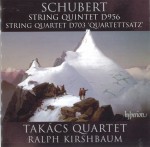 There’s yet another fine recording of the wonderful Schubert String Quintet in C major, D956, this time by the Takacs Quartet with Ralph Kirshbaum on the always-reliable Hyperion label (CDA67864). Written just a few months before the composer’s death in 1828, it’s a work of great range and depth and one which always seems to draw the best out of its performers. I reviewed an excellent CD of the same work by the Arcanto Quartett just last November, and this latest issue is of an equally high standard. Schubert’s Quartettsatz, the String Quartet Movement in C minor, D703, completes the disc; it was the only completed movement of a string quartet both started and abandoned in 1820.
There’s yet another fine recording of the wonderful Schubert String Quintet in C major, D956, this time by the Takacs Quartet with Ralph Kirshbaum on the always-reliable Hyperion label (CDA67864). Written just a few months before the composer’s death in 1828, it’s a work of great range and depth and one which always seems to draw the best out of its performers. I reviewed an excellent CD of the same work by the Arcanto Quartett just last November, and this latest issue is of an equally high standard. Schubert’s Quartettsatz, the String Quartet Movement in C minor, D703, completes the disc; it was the only completed movement of a string quartet both started and abandoned in 1820.



